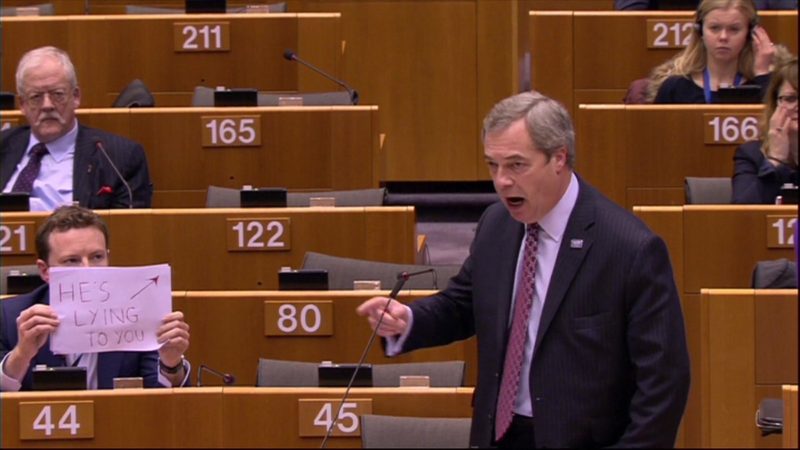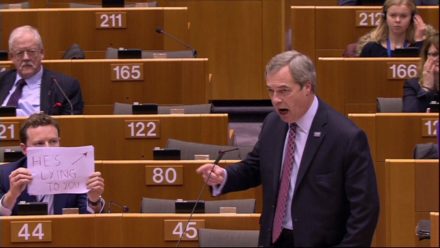

The Daily Telegraph website carried a report by its Europe editor, Peter Foster, on the new £50bn offer made by the Whitehall mandarinate who have taken charge of the Brexit negotiations.
Alongside it was a denunciation of the offer by Nigel Farage. The ex-UKIP leader is a political ecologist as he believes strongly in recycling his used and discarded material. Anyone who has observed the Old Alleynian in action over the years will recognise all the hallmarks of the legendary Bourbon who has learnt nothing and forgotten nothing.
Labour never knew how to deal with Farage – especially me, as one of Labour point-people on Europe after 1997. We were too easy to dismiss him as a loud-mouth xenophobic populist. In truth, and worryingly, Farage spoke to millions of Labour voters, who were not xenophobic but were eurosceptic, and forced Cameron into conceding the Brexit plebiscite which is causing Labour no end of difficulties well into the second year since the referendum.
Yes, Farage was a xenophobe and, like a latter-day Enoch Powell, played on prejudices that are latent in all of us. But, if anything, Farage was a Tory problem and the failure of the Conservatives to challenge him has meant the 21st century has not so far been an era of successful Tory politics.
The organic link between Farage’s UKIP and the Tories was central to the rise of anti-Europeanism over the last 20 years. In 1997, William Hague had to work out as the new young leader of a rump Tory Party with just 166 seats how to trip up Labour’s Harry Potter (Tony Blair) who had rolled into power and looked as if he might stay for far longer then the traditional one-term Labour government.
Hague decided to play the European card. He called for referendums on the long-forgotten Amsterdam and Nice treaties and insisted that Britain would “become a foreign land” if the pro-EU Blair was re-elected in 2001.
But it was not the Conservative Party that benefitted from this turn against Europe but the English equivalent of the Poujadiste movement headed by Farage.
In the fourth French republic of the 1950s, Pierre Poujade led a movement of disgruntled provincial citizens against the elites of Paris who were imposing high taxes, selling out French interests to foreigners in Indo-China or north Africa and urging the politically correct option of drinking milk instead of red wine.
Poujade, like Farage, was a gifted platform speaker with a ready turn of phrase which he used to denounce all the foreign influences from communism to Coca-Cola that were invading France.
Farage took all the anti-European tropes of Hague and his successors as Tory leaders and made them more vivid and real. Conservative MPs had recoiled from Powellism in the 1970s and joined in the national consensus that children of immigrants who formed the BAME communities should become full British citizens.
John Bercow, as a young Tory activist, was briefly secretary of the Monday Club’s repatriation committee but, for the most part, Conservatives sought to engage Britain’s Indian, Pakistani, Bangldeshi and Afro-Caribbean communities. They were all voters. As a result today’s Britain has far more top class members of those communities in high cabinet and political rank, in the professions, media and business than any other EU member state with a similarly sized immigrant population.
But, after 2000, all the racist Powellite tropes about immigrants from Afro-Caribbean and Asia – there were too many people, they took jobs and housing, they used the NHS, they had lots of children who didn’t speak English, they brought in poor relatives – were applied to white Catholics from East Europe.
Farage became the past-master of this latter-day Powellism and could always out-do any Conservative with xenophobic denunciations of European citizens working in Britain, or claims that the EU had reduced Britain to a vassal state of Brussels.
His appeal worked when Europe was on the ballot paper, as was the case in European parliamentary elections, and the Brexit referendum. Voters were not interested in UKIP as part of the government of Britain and rejected all of Farage’s efforts to become an MP. Academic Matthew Goodwin and Frank Field predicted UKIP would win northern Labour seats in the Commons. In fact, UKIP got just 1.8 per cent of the vote in the June election this year.
Like Poujade, the Farage-UKIP moment is dead, and when UKIP ceases to have MEPs, staff, office and bottomless European parliament expenses after April 2019 then the party will be over.
Therefore it was a surprise to see the Daily Telegraph offering such a prominent platform to Farage. The exposures about his links to Julian Assange and the tweets and money said to have come from Russia are not exactly where 21st century Tory MPs want to be.
Goodbye, Nigel. You had your decade of Question Time glory but now that the grown-ups are taking charge of Brexit, the game is over and it’s time to leave the field.
Denis MacShane is a former Europe minister. His book Brexit, No Exit. Why (in the End) Britain Won’t Leave Europe was published in July.




More from LabourList
Scottish Parliament elections 2026: Full list of Labour candidates for Holyrood
‘As metro mayors gain power, Labour must tighten political accountability’
Letters to the Editor – week ending 22 February 2026